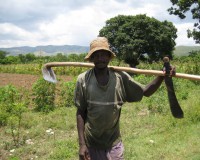
Sustainable Agriculture & Natural Resource Management (SANREM)
Sub-Sector:
Natural Resource Management
Status: Current
|
Start – End Date:
1992 – Present

Regions:
Asia, Europe and Eurasia, Global, Latin America and the Caribbean, Middle East, Sub-Saharan Africa, US and Canada
Related Key Topics:
Capacity Building, Climate Change, Food Security, Gender, Health and Nutrition, Innovation, Markets, Natural Resource Management, Policy, Productivity
Contact
Office of International Research, Education, and Development (OIRED)
526 Prices Fork Road
Blacksburg, VA 24061-0378
TEL: +1-540-231-1230;
Fax: +1-540-231-1402
sanrem@vt.edu
Dr. Adrian Ares,
Program Director
aresa@vt.edu
Dr. Keith Moore,
Associate Director
keithm@vt.edu
Julia Katz,
Editor/Communications Coordinator
jakatz@vt.edu
Since its inception the Feed the Future Innovation Lab for Collaborative Research on Sustainable Agriculture and Natural Resource Management (Feed the Future SANREM Innovation Lab) has focused on promoting the participatory involvement of farmers and other key decision-makers and implementers in the development of sustainable natural resource management at the farm, landscape, and provincial levels and in later phases reaching decision-makers on the national, regional, and global levels. Building on these efforts, the SANREM Innovation Lab seeks to increase smallholders’ food security through the introduction of conservation agriculture production systems (CAPS).
In its most current phase the SANREM Innovation Lab has used a conservation agriculture production systems (CAPS) approach that incorporates research themes like gender integration and payments for environmental services into its long-term research award projects and cross-cutting research activities. SANREM is working to reduce food insecurity, increase productivity, and the sustainability of farming systems for smallholders in Haiti. This will be achieved through an assessment of farm and livelihood practices, development of CAPS which will improve livestock and crop production, and local and institutional capacity building efforts. SANREM is also addressing how conservation measures can help smallholders in Cambodia and the Philippines cope with the expansion of degraded landscapes which are contributing to food insecurity and pressure on natural resources like forests, soil, and water. SANREM is working to adapt sustainable practices to local conditions in Cambodia and the Philippines by assessing conditions, minimizing costs and risks for smallholders by identifying field and farm-level CAPS, and determining the gendered limitations and advantages that can promote adoption of CAPS.
In recent years SANREM has partnered with many of the International Agricultural Research Centers (IARCs) including: International Rice Research Institute (IRRI), International Livestock Research Institute (ILRI), International Institute of Tropical Agriculture (IITA), International Crops Research Institute for the Semi-Arid Tropics (ICRISAT), World Agroforestry Centre (ICRAF), CGIAR Challenge Program on Water and Food (CPWF), World Vegetable Center (AVRDC), and the International Maize and Wheat Improvement Center (CIMMYT). SANREM has and continues to support long-term degree students at U.S. and developing country universities. These students have come from at least 25 countries including the U.S.
During the most current phase SANREM has worked in Asia (India, Nepal, Cambodia, Philippines), Latin America and the Caribbean (Haiti, Ecuador, Bolivia), Sub-Saharan Africa (Ethiopia, Lesotho, Ghana, Mali, Mozambique, Uganda, Kenya). Of these countries, 64 percent are Feed the Future priority countries.
The SANREM Innovation Lab management entity is based at Virginia Tech and is led by Program Director Dr. Adrian Ares.
